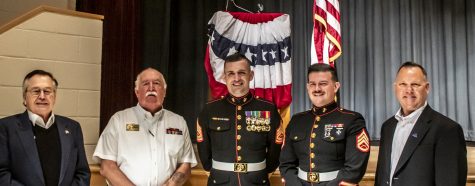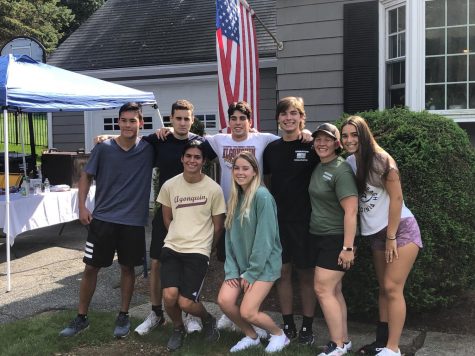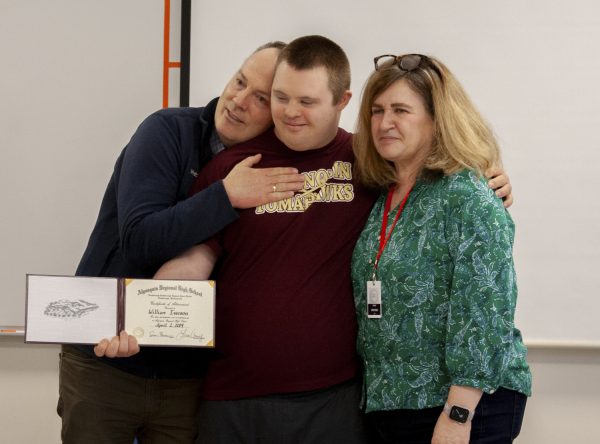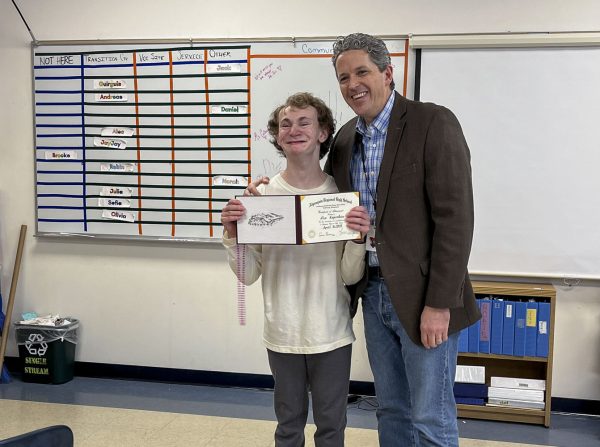Senior to graduate early to join Marines
Senior Chris Gil will graduate from high school early to join the Marines.
November 9, 2021
Senior Chris Gil, who has been training for the Marines since June, is graduating early in January to join what many consider to be the most challenging branch of the military.
Gil is in the Delayed Entry Program, which is a Poolee training program. Poolees are those who have enlisted in the Marines but have not yet gone to bootcamp. In training, Poolees learn about all the challenges they will face in boot camp and their future career in the Marine Corp.
According to Gil, Poolees do workouts together every Tuesday and Thursday, in addition to his own workouts almost every day of the week. On the second Saturday every month, all the Poolees in Worcester County, about 60 to 80 people, meet up for a workout, which is called a function.
So far, Gil has learned a lot of what the Marines call general knowledge.
“I’ve learned all the rankings, E1 through E8 which are, Private, Private First Class, Lance Corporal, Corporal, Sergeant, Staff sergeant and Gunnery Sergeant,” Gil said. “I’ve also learned that it takes a different dedication to want to do something like [joining the Marines].”
Gil has always wanted to join the military. After learning about the military’s benefits, his decision was clear.
“The challenge made me decide on the Marine Corp,” Gil said.
The Marines are widely considered to be the hardest branch of the military in terms of training with its 13 week boot camp and very high physical and mental demands. Other branches like the Army and Navy have 10 and 9 week boot camps.
“To be able to be proud to have that title of a Marine is definitely a big factor in choosing that branch,” Gil said.
According to Gil, the military also offers a lot of benefits, such as paying for college, job opportunities and a good paycheck.
“Coming from a not so wealthy family, college wasn’t the best financial option,” Gil said. “I’m going to college while I serve.”
The Marine Corp pays for a Marine’s college as long as they maintain at least a C average, and Gil plans to take classes on top of his full-time job as a Marine.
“In the Marines, you have what’s called working hours which depend on your job,” Gil said. “It’s usually [6 a.m. to 3 p.m. or 9 a.m. to 5 p.m.]. After that, you go to a classroom and eventually get your degree.”
Currently, Gil has a contract of four years active duty and four years inactive reserve, which he decided on after working with a recruiter.
“Joining the Marines or any branch is a step-by-step process,” Gil said. “You start by talking to a recruiter, and they try to build a relationship with you.”
Gil’s recruiter, Staff Sergeant Ratliff, is the one for all Algonquin students.
“They set you up and they talk with your parents,” Gil said. “They get signatures to send you to MEPS (Military Entrance Processing Station) which is where they do your physical and ASVAB (Armed Services Vocational Aptitude Battery).”
ASVAB is a test that determines where an individual’s intelligence stands on a percentile score. If someone passes their ASVAB and physical, then they become a Poolee.
“I scored a 74%, which means I did better than 74% of people who took the test for the Marine Corp,” Gil said. “The ASVAB tells you what jobs you qualify for.”
Gil selected a combat engineering job. Combat engineering is about building, repairing, and maintaining buildings, roads, and power supplies, frequently while under fire or in dangerous combat environments. The job is very important because they’re often on the front line.
“I chose it because it gives me, from what I’ve been told, the satisfaction of infantry, but it’s not infantry,” Gil said.
In January, Gil will complete all his requirements to graduate from Algonquin, and he’ll ship off to boot camp in Parris Island, South Carolina to begin his journey.
Gil recommends more students should be open to learning about a future in the military.
“Talking to a recruiter of any branch and opening your eyes to the benefits is something everyone should do,” Gil said. “Learning about the benefits is something that’s good for your knowledge.”
Updated on Nov. 10, 2021: Gil’s recruiter was misidentified in the original publication. His name was corrected to Staff Sergeant Ratliff.





























doja cat • Nov 10, 2021 at 4:13 pm
yuh
Alexis Texas • Nov 10, 2021 at 1:34 pm
Hey i have an offer for you. Email me 😉
Mia Malkova • Nov 10, 2021 at 1:33 pm
He’s kind of cute.